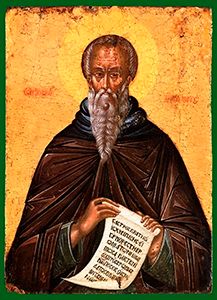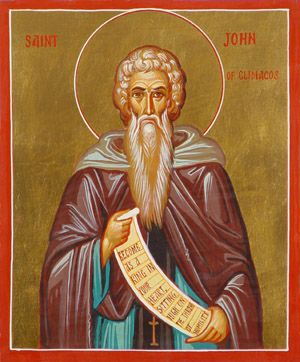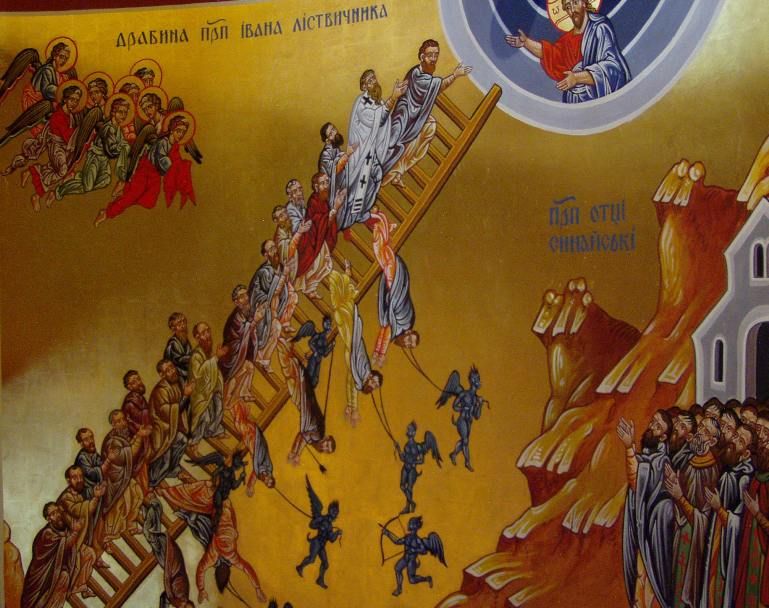Below, an excerpt from “The Ladder of Paradise,” Step 23: On Pride
Pride is a denial of God, an invention of the devil, contempt for men. It is the mother of condemnation, the offspring of praise, a sign of barrenness. It is a flight from God's help, the precursor of madness, the cause of downfall. It is the cause of satanic possession, the source of anger, the gateway of hypocrisy. It is the fortress of demons, the guardian of sins, the source of hardheartedness. It is the denial of compassion, a bitter Pharisee, a cruel judge. It is the foe of God. It is the root of blasphemy.
Pride begins where vainglory leaves off. Its midpoint comes with the humiliation of our neighbor, the shameless parading of our achievements, complacency, and unwillingness to be found out. It ends with the spurning of God's help, the exalting of one's own efforts and a devilish disposition.
Listen, therefore, all who wish to avoid this pit. This passion often draws strength initially from the giving of thanks, and at first it does not shamelessly urge us to renounce God. I have seen people who speak aloud their thanks to God but who in their hearts are glorifying themselves, something demonstrated by that Pharisee with his "O God, I thank You" (Luke 18:11).
Pride takes up residence wherever we have lapsed, for a lapse is in fact an indication of pride. And an admirable man said once to me, "Think of a dozen shameful passions. Love one of them, I mean pride, and it will take up the space of all the other eleven."
A proud Christian argues bitterly with others. The humble Christian is loath to contradict them.
The cypress tree does not bend to the ground to walk, nor does the haughty Christian bend down in order to gain obedience.
The proud man wants to be in charge of things. He would feel lost otherwise.
"God resists the proud" (James 4:6). Who then could have mercy on them? Before God every proud man is unclean. Who then could purify such a person?
For the proud correction is a fall, a thorn (cf. 2 Cor. 12:7) is a devil, and abandonment by God is madness. Whereas in the first two instances there are human cures available, this last cannot be healed by man.
To reject criticism is to show pride, while to accept it is to show oneself free of this fetter.
Pride and nothing else caused an angel to fall from heaven. And so one may reasonably ask whether one may reach heaven by humility alone without the help of any other virtue.
 A help to the proud is submissiveness, a tougher and humbler way of life, and the reading of the supernatural feats of the Fathers. Even then there will perhaps be little hope of salvation for those who suffer from this disease.
A help to the proud is submissiveness, a tougher and humbler way of life, and the reading of the supernatural feats of the Fathers. Even then there will perhaps be little hope of salvation for those who suffer from this disease.While it is disgraceful to be puffed up over the adornments of others, it is sheer lunacy to imagine that one has deserved the gifts of God. You may be proud only of the achievements you had before the time of your birth. But anything after that, indeed the birth itself, is a gift from God. You may claim only those virtues in you that are there independently of your mind, for your mind was bestowed on you by God. And you may claim only those victories you achieved independently of the body, for the body too is not yours but a work of God.
Do not be self-confident before judgment has been passed on you. Remember the guest at the marriage feast. He got there, and then, tied hand and foot, he was thrown into the dark outside (cf. Matt. 22:13). So do not be stiff-necked, since you are a material being. Many although holy and unencumbered by a body were cast out of Heaven.
When the demon of pride gets a foothold for himself among his own servants, he appears to them, in sleep or awake, and he looks like a holy angel or martyr and he hints at mysteries to be revealed or spiritual gifts to be granted, that the wretches may be deceived and driven utterly out of their minds.
If we were to die ten thousand times for Christ, we would still not have repaid what we owe, for in value rather than physical substance there is no comparison between the blood of God and that of His servants.
We should always be on the lookout to compare ourselves with the Fathers and the lights who have gone before us. If we do, we will discover that we have scarcely begun the ascetic life, that we have hardly kept our vow in a holy manner, and that our thinking is still rooted in the world.
A real Christian is one whose soul's eye is not haughty and whose bodily senses are unmoved.
A Christian is one who fights his enemies, like the wild beasts that they are, and harries them as he makes his escape from them.
To be a Christian is to know ecstasy without end and to grieve for life.
A Christian is shaped by virtues in the way that others are shaped by pleasures.
A Christian has an unfailing light in the eye of the heart.
A Christian is an abyss of humility in which every evil spirit has been plunged and smothered.
Pride makes us forget our sins, for the remembrance of them leads to humility.
Pride is utter poverty of soul disguised as riches, imaginary light where in fact there is darkness. This abominable vice not only stops our progress but even tosses us down from the heights we have reached.
The proud man is a pomegranate, rotten within, while outwardly radiant.
A proud Christian needs no demon. He has turned into one, an enemy to himself.
Darkness is alien to light. Pride is alien to every virtue.
Blaspheming words rise up in the hearts of the proud, heavenly visions in the hearts of the humble.
A thief hates the sun. A proud man despises the meek.
It happens, I do not know how, that most of the proud never really discover their true selves. They think they have conquered their passions and they find out how poor they really are only after they die.
The man ensnared by pride will need God's help, since man is of no use to him.
I captured this senseless deceiver once. It was rising up in my heart and on its shoulders was vainglory, its mother. I roped them with the noose of obedience and flailed them with the whip of humility. Then I lashed them and asked how they had managed to gain access to me. "We have no beginning and no birth," they said, "for we are the source and the begetters of all the passions. The strongest opposition to us comes from the contrition of heart that grows out of obedience. We can endure no authority over us, which is why we fell from heaven though we had authority there. In short, we are the authors and the progenitors of everything opposed to humility, for everything that favors humility brings us low. We prevail everywhere except in heaven. So, then, where will you run to escape us? You will find us often where there is patient endurance of dishonor, where there is obedience and freedom from anger, where there is willingness to bear no grudge, where one's neighbor is served. And our children are the falls of those who lead the life of the spirit. Their names: Anger, Calumny, Spite, Irritability, Shouting, Blasphemy, Hypocrisy, Hatred, Envy, Argumentativeness, Self-will, Disobedience.
"There is only one thing with which we cannot interfere, and the violence you do us will make us admit what this is. If you can honestly condemn yourself before the Lord, then indeed you will find us as flimsy as a cobweb. For, you see, Vainglory is pride's saddle-horse on which I am mounted. But holy Humility and Self-accusation will laugh at the horse and its rider and will joyfully sing the song of triumph: 'Let us sing to the Lord, for He has been truly glorified. Horse and rider He has thrown into the sea' (Exod. 15:1), into the depths of humility."









0 comments:
Post a Comment
Thanks for leaving a comment. If you wish to submit a prayer request, however, please do so above, using the "Contact" tab.